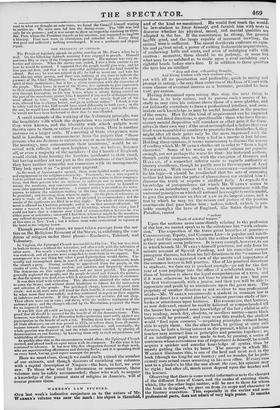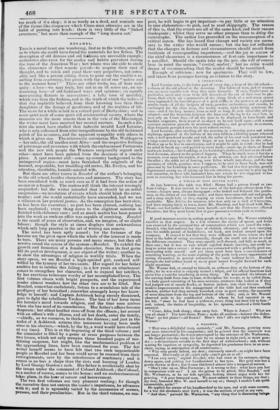WARREN'S LAW STUDIES.
OUR last week's indicative conjecture as to the nature of Mr. W11/1211N'S volume was near the mark: his object is threefold, vant to what we thought an ante-room, we found the Gener..4 himself waiting I and of the kind we mentioned. He would first teach the would-, to receive es. We were soon led into the dining-room. The table was laid I be law-student to know himself, rind furnish him with tests to nnly for six persons ; and it was meant to show us respect by receiving Us alone. discover whether his physical, moral, And mental qualities are 21Ir. Post, whom the President regards as his minister, was requested to im !ore
adapted to the bar. If the constitution be strong, the general
health good, and the lungs capable of incessant bawling, the anima: man is sufficient. The moral desiderata embrace an equa- ble and pelent mind, a power of cutting fashionable acquaintance, of eschewing balls and routs, and even of indulging calls with caution : moreover, there should be no jealousy, or none but what may be so subdued as to smile upon a rival ravishing one's rightful briefs before one's face. If in addition to these qualities the tyro has an intellect
" deep and slow, exhausting thought,
And hiving wisdom with esch studious year,"— yet with all its penetration anti profundity, quick in seeing and prompt in acting,—he may then enterone of the Inns of Court with some chance of eventual success as a barrister, provided he have 1501. per annum.
Having determined upon taking this step, the next thing to
be done is to help nature, and to pursue such a course of by- study as may raise his notions above those of a mere plodder, and yet indirectly contribute to form a professional intellect, and item- mulate such knowledge as may be useful hereafter in the practice of the courts. How far this kind of acquirement can be imparted by cut and dried directions, is questionable : those who have the ne- cessary mental disposition will somehow or other gain it for them- selves in their own way ; if the most accomplished scholars that ever lived were assembled in conclave to prescribe for a dunderhead. they might after all their pains only be the more impressed with the remark of Solomon, that to bray a fool in a mortar is lost labour. Holding these opinions, it seems unnecessary to discuss the course of reading which Mr. WARREN chalks out in order to " form a legal. character." Some of his works on general science are popular enough, yet not perhaps the worse for that: his historical authors, though pretty numerous, are, with the exception of GIBBON and HALLAM, of a somewhat inferior caste as regards authority or literary excellence, though he partly errs in the company of Lord MANSFIELD. With respect to CHI LLI NGW0RTH—ICCOMMCIVIC11 for his logic—it should be recollected that his arts of reasoning neither led him into the paths of pleasantness nor enabled him to discover the truth or acquire a stedfast faith. As regaids tl:e knowledge of jurisprudence .(at which Mr. WARREN seems to sneer as an introductory study), surely an acquaintance with the universal principles on which all national laws ought to rest is useful, to give the practitioner an idea of LAW ill its largest sense, and a test by which he may try the reason and justice of the positive enactments that pass before hint : unless, indeed, (which is pro- bable enougle). the laws of England, like Satan disguised in Paradise, cannot
" endure Touch of celestial -temper." " endure Touch of celestial -temper."
Upon the sections more immediately relating to 'the profession of the law, we cannot speak as to the substance but "with submis- sion." The exposition of the three great branches of practice— Conveyancing, Equity, and Common Law—is popular and intelli- gible; and the suggestions which the author tenders with respect to their pursuit seem judicious. It is easy enough, however, to see in which branch Mr. WARREN himself practices, not only from his minute account of Special Pleading, and his somewhat earnest panegyric thereon, but from his full directions to the "common law pupil," and his exaggerated view of the merits and importance of the common lawyer in full practice. One of his practical directions to students, we dare say is prudent enough—go not for the first year of your pupilage into the office of a celebrated man, for his class of business is above the legal comprehension of a tyro, and if it were otherwise he has not time to attend to you : but pass the first twelvemonth with a junior, and then you will be able to appreciate and profit by an attendance upon the great man. The propriety of another direction is not so clear to non-professional minds—Mr. WARREN recommends a student in common law to proceed direct to a special pleader's, without previous study of law- books or attendance upon lectures. His reasons are, that lectures, as now delivered, cannot be readily followed or comprehended till the hearer has acquired some knowledge of the law ; whilst in soli- tary, reading, much dry, obsolete, or needless matter—mere black letter—will be perused; and even were this avoided, the student would "feed upon essences"—acquiring principles without being able to apply them. On the other hand, by getting at once into harness, he feels a living interest in the pursuit, whilst a judicious teacher may instruct him in principles and practice together; as, if an intelligent pupil were made to test, by parsing, a series of sentences whose correctness was of importance to himself; he would acquire a quicker and sounder knowledge of syntax than by merely getting the rules by heart. The passage in which Mr. WARREN illustrates this, is one of the best and most real in the book (though too long for our limits); and no wonder, for he judi- ciously uses actual cases occurring in his own office. If every case sent to a pleader's be like the one about the cow, his opinion may be right ; but after all, much must depend upon the teacher and the learner. Observing that there is some useful information as to the charges of the different Inns of Court, and the modes of entering them, which, like the other legal matter, will be new to those for whom the book is designed, we pass on from its scope and character to the literary execution. This, especially in the earlier and non- professional parts, does not admit of very high praise. It smacks



























 Previous page
Previous page